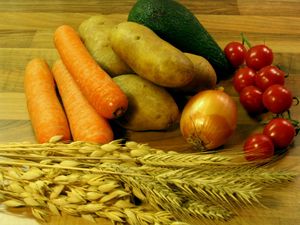Food
The amount of Food for human beings that can be brought from Earth to Mars is limited, and the logistics of a continued food transport for the long term is expensive. Especially an autonomous colony needs it's own food production. Reasons for this are cost reduction and the achievement of independence from Earth. Last but not least, the own food can be of higher quality and fresh, including a natural mix of vitamins and minerals.
Contents
Food that can be brought from Earth
- Several varieties of dehydrated food.
- Natural food that contains large amounts of fat and carbohydrates, such as nuts.
- Concentrated fruit juice.
- Light weight, high energy foods with a long shelf-life.
Local Production Methods
- Vegetable can be grown in greenhouses or on green walls.
- Proteins, fat and carbohydrates can be produced by a biotechnological factory
- In-vitro meat
- Animals, such as chicken or fish, may be raised in sections of greenhouses.
- It must be taken into account that the production of 1 kg meat requires 7 to 16 kg of vegetable matter.[1]
- In addition, it takes 2000 to 3000 litres of water to produce 1 kg of meat, it only takes 100 litres of water to grow 1 kg of grain. Water will be a very valuable commodity on Mars, so the first generation of settlers may well be vegetarian by necessity.
- Growing insects and their larvea (e.g. flour worms) can provide valuable proteins and might consume not too much vegetable mass (compared with cattle).
- Algae
- Some food (possibly genetically modified) may be grown in the Martian atmosphere. Results from the Phoenix lander indicate that some vegetables may be grown in caves safe from radiation.
Big Nate!Good to hear from you! I hope you're keeping well. Thanks for your feceabdk! I'm glad to know that podcasting might just be the medium of most effective communication for Letters' Lounge! Does the podcast remind you of the countless hours I spent in your office?You have my contact information, so anytime you want help just give me a call!Talk to you soon, Big Nate!
Facts and figures
- Sweden: 26260 kg potatoes per hectare [2]
- Sweden: about 6000 kg wheats per hectare [3]
- "Plain boiled potatoes are naturally low in fat and provide 72 kcal/100g (306 KJ/100g)" [4]
- "Wheat flour provides 310 - 340 kcal/100g (1320 - 1450 KJ/100g)"[5]
i have to say, adequate vitiman d/sunshine stands out to me as the most powerful & obvious foundational vitiman that prevents & eliminates cancer. although technically, it's a steroid hormone precursor & not a vitiman at all, so if you're being technical, i can understand why it's not on your list. vitiman d also affects more genes in the human body than any single vitiman known to science, which is another reason i think of it first as probably the most important foundational vitiman for overall health & not just cancer prevention/reversal.a few hours spent catching up on the research at vitimandcouncil.org grassrootshealth.net & vitimanddoc.com should put things in perspective.95% of all the vitiman d we get in our lifetime will be from the sun alone, food sources are a comparitively negligable source of vitiman d hence consistently getting as much sunshine as possible on as much skin as possible without without burning & without sunscreen *or* 1,000 i.u. of vitiman d3 per 25lbs. of body weight (in the absents of sunlight) will be a powerful way to stave of cancer & a long list of other diseases.







